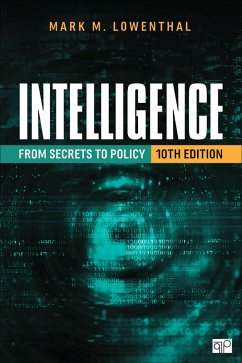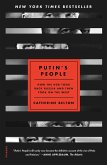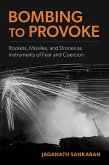Versandkostenfrei innerhalb Deutschlands
133,99 €
inkl. MwSt.
Versandkostenfrei*
Erscheint vorauss. 14. November 2025
Melden Sie sich
hier
hier
für den Produktalarm an, um über die Verfügbarkeit des Produkts informiert zu werden.

67 °P sammeln
- Broschiertes Buch
Now in its Tenth Edition, Mark Lowenthal¿s book is the go-to resource for understanding the intelligence community.
Andere Kunden interessierten sich auch für
![Kamala's Way Kamala's Way]() Dan MorainKamala's Way15,99 €
Dan MorainKamala's Way15,99 €![The Secret World The Secret World]() Christopher AndrewThe Secret World21,99 €
Christopher AndrewThe Secret World21,99 €![Becoming Abolitionists Becoming Abolitionists]() Derecka PurnellBecoming Abolitionists23,99 €
Derecka PurnellBecoming Abolitionists23,99 €![To Obama To Obama]() Jeanne Marie LaskasTo Obama15,99 €
Jeanne Marie LaskasTo Obama15,99 €![Putin's People Putin's People]() Catherine BeltonPutin's People16,99 €
Catherine BeltonPutin's People16,99 €![We Are Bellingcat We Are Bellingcat]() Eliot HigginsWe Are Bellingcat15,99 €
Eliot HigginsWe Are Bellingcat15,99 €![Bombing to Provoke Bombing to Provoke]() Jaganath SankaranBombing to Provoke20,99 €
Jaganath SankaranBombing to Provoke20,99 €-
-
-
Now in its Tenth Edition, Mark Lowenthal¿s book is the go-to resource for understanding the intelligence community.
Hinweis: Dieser Artikel kann nur an eine deutsche Lieferadresse ausgeliefert werden.
Hinweis: Dieser Artikel kann nur an eine deutsche Lieferadresse ausgeliefert werden.
Produktdetails
- Produktdetails
- Verlag: Sage Publications Inc Ebooks
- 10 Revised edition
- Seitenzahl: 624
- Erscheinungstermin: 14. November 2025
- Englisch
- Abmessung: 228mm x 152mm
- ISBN-13: 9781071940716
- ISBN-10: 1071940716
- Artikelnr.: 73528611
- Herstellerkennzeichnung
- Libri GmbH
- Europaallee 1
- 36244 Bad Hersfeld
- gpsr@libri.de
- Verlag: Sage Publications Inc Ebooks
- 10 Revised edition
- Seitenzahl: 624
- Erscheinungstermin: 14. November 2025
- Englisch
- Abmessung: 228mm x 152mm
- ISBN-13: 9781071940716
- ISBN-10: 1071940716
- Artikelnr.: 73528611
- Herstellerkennzeichnung
- Libri GmbH
- Europaallee 1
- 36244 Bad Hersfeld
- gpsr@libri.de
Mark M. Lowenthal has over forty-four years of experience in U.S. intelligence. He has served as the Assistant Director of Central Intelligence for Analysis and Production, Vice Chairman for Evaluation on the National Intelligence Council, staff director of the House Permanent Select Committee on Intelligence, office director and as a Deputy Assistant Secretary of State in the State Department¿s Bureau of Intelligence and Research (INR), and Senior Specialist in U.S. Foreign Policy at the Congressional Research Service, Library of Congress. He is now the President and CEO of the Intelligence & Security Academy, an education and consulting firm. Dr. Lowenthal received his BA from Brooklyn College and his PhD in history from Harvard University. He serves as an adjunct professor at the Johns Hopkins University; the National Intelligence University; Sciences Po (Paris); and the Norwegian Defence Intelligence School. He was an adjunct at Columbia University from 1993-2007.
Preface
Acronyms
Chapter 1: What Is "Intelligence"?
Why Have Intelligence Agencies?
What Is Intelligence About?
Key Terms
Further Readings
Chapter 2: The Development of U.S. Intelligence
Major Themes
Major Historical Developments
Key Terms
Further Readings
Chapter 3: The U.S. Intelligence Community
Alternative Ways of Looking at the Intelligence Community
The Many Different Intelligence Communities
Intelligence Community Relationships That Matter
The Intelligence Budget Process
Key Terms
Further Readings
Chapter 4: The Intelligence Process-A Macro Look: Who Does What for Whom?
Requirements
Collection
Processing and Exploitation
Analysis and Production
Dissemination and Consumption
Feedback
Thinking About the Intelligence Process
Key Terms
Further Readings
Chapter 5: Collection and the Collection Disciplines
Overarching Themes
Strengths and Weaknesses
Conclusion
Key Terms
Further Readings
Chapter 6: Analysis
Major Themes
Analytical Issues
Intelligence Analysis: An Assessment
Key Terms
Further Readings
Chapter 7: Counterintelligence
Internal Safeguards
External Indicators and Counterespionage
Problems in Counterintelligence
Leaks
Economic Espionage
National Security Letters
Conclusion
Key Terms
Further Readings
Chapter 8: Covert Action
The Decision-Making Process
The Range of Covert Actions
Issues in Covert Action
Assessing Covert Action
Key Terms
Further Readings
Chapter 9: The Role of the Policy Maker
The U.S. National Security Policy Process
Who Wants What?
The Intelligence Process: Policy and Intelligence
Key Terms
Further Readings
Chapter 10: Oversight and Accountability
Executive Oversight Issues
Congressional Oversight
Issues in Congressional Oversight
Internal Dynamics of Congressional Oversight
The Courts
Conclusion
Key Terms
Further Readings
Chapter 11: The Intelligence Agenda: Nation-States
The Primacy of the Soviet Issue
The Emphasis on Soviet Military Capabilities
The Emphasis on Statistical Intelligence
The "Comfort" of a Bilateral Relationship
Collapse of the Soviet Union
Intelligence and the Soviet Problem
The Current Nation-State Issue
Key Terms
Further Readings
Chapter 12: The Intelligence Agenda: Transnational Issues
U.S. National Security Policy and Intelligence After the Cold War
Intelligence and the New Priorities
Cyberspace
Foreign Malign Influence
Terrorism
Proliferation
Health Issues
Climate Change
Narcotics
Economics and Energy
Demographics
Support to the Military
Conclusion
Key Terms
Further Readings
Chapter 13: Ethical and Moral Issues in Intelligence
General Moral Questions
Issues Related to Collection and Covert Action
Analysis-Related Issues
Oversight-Related Issues
Whistle-Blowers
The Media
Conclusion
Further Readings
Chapter 14: Intelligence Reform
The Purpose of Reform
Issues in Intelligence Reform
Conclusion
Key Terms
Further Readings
Chapter 15: Foreign Intelligence Services
Britain
China
France
Israel
Russia
Other Services
Other Services in Brief
Conclusion
Further Readings
Appendix 1: Additional Bibliographic Citations and Websites
Appendix 2: Major Intelligence Reviews or Proposals
Acronyms
Chapter 1: What Is "Intelligence"?
Why Have Intelligence Agencies?
What Is Intelligence About?
Key Terms
Further Readings
Chapter 2: The Development of U.S. Intelligence
Major Themes
Major Historical Developments
Key Terms
Further Readings
Chapter 3: The U.S. Intelligence Community
Alternative Ways of Looking at the Intelligence Community
The Many Different Intelligence Communities
Intelligence Community Relationships That Matter
The Intelligence Budget Process
Key Terms
Further Readings
Chapter 4: The Intelligence Process-A Macro Look: Who Does What for Whom?
Requirements
Collection
Processing and Exploitation
Analysis and Production
Dissemination and Consumption
Feedback
Thinking About the Intelligence Process
Key Terms
Further Readings
Chapter 5: Collection and the Collection Disciplines
Overarching Themes
Strengths and Weaknesses
Conclusion
Key Terms
Further Readings
Chapter 6: Analysis
Major Themes
Analytical Issues
Intelligence Analysis: An Assessment
Key Terms
Further Readings
Chapter 7: Counterintelligence
Internal Safeguards
External Indicators and Counterespionage
Problems in Counterintelligence
Leaks
Economic Espionage
National Security Letters
Conclusion
Key Terms
Further Readings
Chapter 8: Covert Action
The Decision-Making Process
The Range of Covert Actions
Issues in Covert Action
Assessing Covert Action
Key Terms
Further Readings
Chapter 9: The Role of the Policy Maker
The U.S. National Security Policy Process
Who Wants What?
The Intelligence Process: Policy and Intelligence
Key Terms
Further Readings
Chapter 10: Oversight and Accountability
Executive Oversight Issues
Congressional Oversight
Issues in Congressional Oversight
Internal Dynamics of Congressional Oversight
The Courts
Conclusion
Key Terms
Further Readings
Chapter 11: The Intelligence Agenda: Nation-States
The Primacy of the Soviet Issue
The Emphasis on Soviet Military Capabilities
The Emphasis on Statistical Intelligence
The "Comfort" of a Bilateral Relationship
Collapse of the Soviet Union
Intelligence and the Soviet Problem
The Current Nation-State Issue
Key Terms
Further Readings
Chapter 12: The Intelligence Agenda: Transnational Issues
U.S. National Security Policy and Intelligence After the Cold War
Intelligence and the New Priorities
Cyberspace
Foreign Malign Influence
Terrorism
Proliferation
Health Issues
Climate Change
Narcotics
Economics and Energy
Demographics
Support to the Military
Conclusion
Key Terms
Further Readings
Chapter 13: Ethical and Moral Issues in Intelligence
General Moral Questions
Issues Related to Collection and Covert Action
Analysis-Related Issues
Oversight-Related Issues
Whistle-Blowers
The Media
Conclusion
Further Readings
Chapter 14: Intelligence Reform
The Purpose of Reform
Issues in Intelligence Reform
Conclusion
Key Terms
Further Readings
Chapter 15: Foreign Intelligence Services
Britain
China
France
Israel
Russia
Other Services
Other Services in Brief
Conclusion
Further Readings
Appendix 1: Additional Bibliographic Citations and Websites
Appendix 2: Major Intelligence Reviews or Proposals
Preface
Acronyms
Chapter 1: What Is "Intelligence"?
Why Have Intelligence Agencies?
What Is Intelligence About?
Key Terms
Further Readings
Chapter 2: The Development of U.S. Intelligence
Major Themes
Major Historical Developments
Key Terms
Further Readings
Chapter 3: The U.S. Intelligence Community
Alternative Ways of Looking at the Intelligence Community
The Many Different Intelligence Communities
Intelligence Community Relationships That Matter
The Intelligence Budget Process
Key Terms
Further Readings
Chapter 4: The Intelligence Process-A Macro Look: Who Does What for Whom?
Requirements
Collection
Processing and Exploitation
Analysis and Production
Dissemination and Consumption
Feedback
Thinking About the Intelligence Process
Key Terms
Further Readings
Chapter 5: Collection and the Collection Disciplines
Overarching Themes
Strengths and Weaknesses
Conclusion
Key Terms
Further Readings
Chapter 6: Analysis
Major Themes
Analytical Issues
Intelligence Analysis: An Assessment
Key Terms
Further Readings
Chapter 7: Counterintelligence
Internal Safeguards
External Indicators and Counterespionage
Problems in Counterintelligence
Leaks
Economic Espionage
National Security Letters
Conclusion
Key Terms
Further Readings
Chapter 8: Covert Action
The Decision-Making Process
The Range of Covert Actions
Issues in Covert Action
Assessing Covert Action
Key Terms
Further Readings
Chapter 9: The Role of the Policy Maker
The U.S. National Security Policy Process
Who Wants What?
The Intelligence Process: Policy and Intelligence
Key Terms
Further Readings
Chapter 10: Oversight and Accountability
Executive Oversight Issues
Congressional Oversight
Issues in Congressional Oversight
Internal Dynamics of Congressional Oversight
The Courts
Conclusion
Key Terms
Further Readings
Chapter 11: The Intelligence Agenda: Nation-States
The Primacy of the Soviet Issue
The Emphasis on Soviet Military Capabilities
The Emphasis on Statistical Intelligence
The "Comfort" of a Bilateral Relationship
Collapse of the Soviet Union
Intelligence and the Soviet Problem
The Current Nation-State Issue
Key Terms
Further Readings
Chapter 12: The Intelligence Agenda: Transnational Issues
U.S. National Security Policy and Intelligence After the Cold War
Intelligence and the New Priorities
Cyberspace
Foreign Malign Influence
Terrorism
Proliferation
Health Issues
Climate Change
Narcotics
Economics and Energy
Demographics
Support to the Military
Conclusion
Key Terms
Further Readings
Chapter 13: Ethical and Moral Issues in Intelligence
General Moral Questions
Issues Related to Collection and Covert Action
Analysis-Related Issues
Oversight-Related Issues
Whistle-Blowers
The Media
Conclusion
Further Readings
Chapter 14: Intelligence Reform
The Purpose of Reform
Issues in Intelligence Reform
Conclusion
Key Terms
Further Readings
Chapter 15: Foreign Intelligence Services
Britain
China
France
Israel
Russia
Other Services
Other Services in Brief
Conclusion
Further Readings
Appendix 1: Additional Bibliographic Citations and Websites
Appendix 2: Major Intelligence Reviews or Proposals
Acronyms
Chapter 1: What Is "Intelligence"?
Why Have Intelligence Agencies?
What Is Intelligence About?
Key Terms
Further Readings
Chapter 2: The Development of U.S. Intelligence
Major Themes
Major Historical Developments
Key Terms
Further Readings
Chapter 3: The U.S. Intelligence Community
Alternative Ways of Looking at the Intelligence Community
The Many Different Intelligence Communities
Intelligence Community Relationships That Matter
The Intelligence Budget Process
Key Terms
Further Readings
Chapter 4: The Intelligence Process-A Macro Look: Who Does What for Whom?
Requirements
Collection
Processing and Exploitation
Analysis and Production
Dissemination and Consumption
Feedback
Thinking About the Intelligence Process
Key Terms
Further Readings
Chapter 5: Collection and the Collection Disciplines
Overarching Themes
Strengths and Weaknesses
Conclusion
Key Terms
Further Readings
Chapter 6: Analysis
Major Themes
Analytical Issues
Intelligence Analysis: An Assessment
Key Terms
Further Readings
Chapter 7: Counterintelligence
Internal Safeguards
External Indicators and Counterespionage
Problems in Counterintelligence
Leaks
Economic Espionage
National Security Letters
Conclusion
Key Terms
Further Readings
Chapter 8: Covert Action
The Decision-Making Process
The Range of Covert Actions
Issues in Covert Action
Assessing Covert Action
Key Terms
Further Readings
Chapter 9: The Role of the Policy Maker
The U.S. National Security Policy Process
Who Wants What?
The Intelligence Process: Policy and Intelligence
Key Terms
Further Readings
Chapter 10: Oversight and Accountability
Executive Oversight Issues
Congressional Oversight
Issues in Congressional Oversight
Internal Dynamics of Congressional Oversight
The Courts
Conclusion
Key Terms
Further Readings
Chapter 11: The Intelligence Agenda: Nation-States
The Primacy of the Soviet Issue
The Emphasis on Soviet Military Capabilities
The Emphasis on Statistical Intelligence
The "Comfort" of a Bilateral Relationship
Collapse of the Soviet Union
Intelligence and the Soviet Problem
The Current Nation-State Issue
Key Terms
Further Readings
Chapter 12: The Intelligence Agenda: Transnational Issues
U.S. National Security Policy and Intelligence After the Cold War
Intelligence and the New Priorities
Cyberspace
Foreign Malign Influence
Terrorism
Proliferation
Health Issues
Climate Change
Narcotics
Economics and Energy
Demographics
Support to the Military
Conclusion
Key Terms
Further Readings
Chapter 13: Ethical and Moral Issues in Intelligence
General Moral Questions
Issues Related to Collection and Covert Action
Analysis-Related Issues
Oversight-Related Issues
Whistle-Blowers
The Media
Conclusion
Further Readings
Chapter 14: Intelligence Reform
The Purpose of Reform
Issues in Intelligence Reform
Conclusion
Key Terms
Further Readings
Chapter 15: Foreign Intelligence Services
Britain
China
France
Israel
Russia
Other Services
Other Services in Brief
Conclusion
Further Readings
Appendix 1: Additional Bibliographic Citations and Websites
Appendix 2: Major Intelligence Reviews or Proposals







